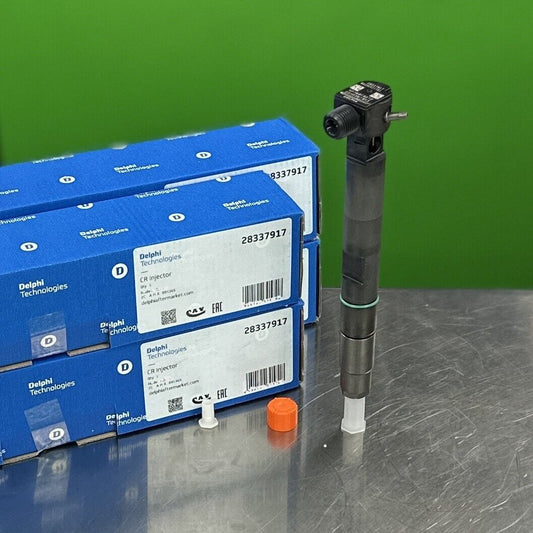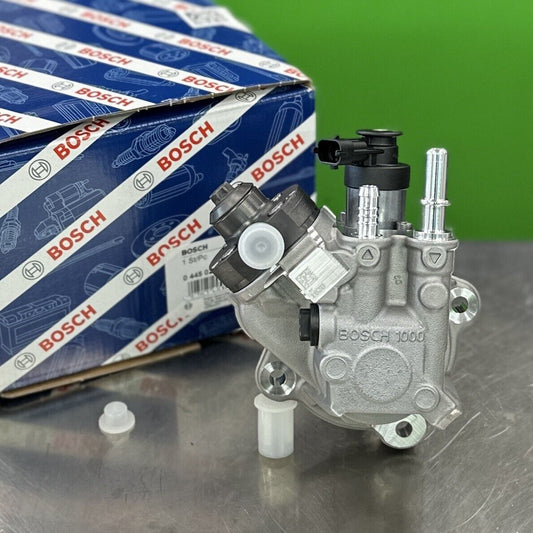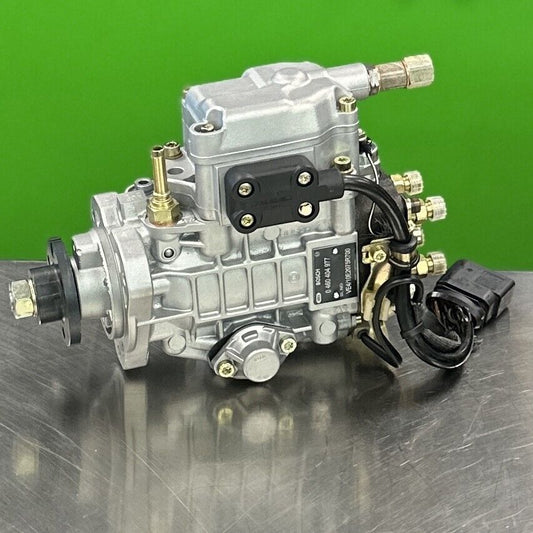The Future of Fuel Injector Technology
As we delve into the future of fuel injector technology, we are met with a landscape of innovation and advancement that is reshaping the automotive and industrial sectors. Fuel injectors, once a humble component of engines, have now evolved into sophisticated pieces of engineering marvel, driving efficiency, performance, and sustainability to new heights.
Picture this - fuel injectors integrated with artificial intelligence (AI). Yes, you heard it right! AI is not just a buzzword in sci-fi movies; it is actively enhancing fuel injector precision, optimizing combustion processes, and reducing harmful emissions. The marriage of AI and fuel injectors is paving the way for a new era of smart engines that operate with unprecedented accuracy and efficiency.
Now, let's talk about electrification and its impact on fuel injection systems. With the rise of electric vehicles, the demand for electric fuel injectors has surged. These innovative injectors are tailored to meet the unique needs of hybrid and electric vehicles, offering benefits such as improved energy efficiency, reduced emissions, and enhanced overall performance.
Enter the realm of 3D printing in fuel injector manufacturing. Imagine the ability to create intricate fuel injector designs with precision and speed, thanks to 3D printing technology. This revolutionary approach not only improves fuel atomization but also enhances durability and performance, setting a new standard in fuel injector production.
Lastly, let's not forget about the exciting developments in hydrogen fuel injection technology. Hydrogen, touted as the fuel of the future, is making waves in the transportation industry. Advancements in hydrogen fuel injection systems have the potential to revolutionize clean energy transportation, offering a sustainable alternative to traditional fossil fuels. However, challenges remain in implementing widespread hydrogen fuel systems, signaling both opportunities and obstacles on the horizon.
Integration of AI in Fuel Injectors
Imagine a world where your car's fuel injector is not just a mechanical component but a smart, AI-powered system that constantly adapts and optimizes its performance. This futuristic scenario is becoming a reality as artificial intelligence (AI) is integrated into fuel injectors, revolutionizing the way engines operate.
AI's role in fuel injectors goes beyond just automation; it is about enhancing precision, efficiency, and overall performance. By leveraging AI algorithms, fuel injectors can adjust fuel delivery in real-time based on various factors such as engine load, speed, and driving conditions. This level of intelligence leads to optimized combustion processes, resulting in improved fuel efficiency and reduced emissions.
One of the key benefits of integrating AI in fuel injectors is the ability to fine-tune the injection process with unparalleled accuracy. AI can analyze vast amounts of data and make split-second decisions to ensure the perfect fuel-air mixture for combustion, maximizing power output while minimizing fuel consumption.
Moreover, AI-powered fuel injectors can learn and adapt over time, continuously optimizing their performance to suit the specific driving habits and conditions of the vehicle. This adaptive capability not only enhances engine efficiency but also extends the lifespan of the fuel injection system.
Picture a scenario where your car's fuel injector anticipates your acceleration needs before you even press the pedal, delivering the precise amount of fuel for a seamless driving experience. This level of responsiveness and intelligence is made possible by the integration of AI in fuel injectors, setting new standards for automotive technology.
In conclusion, the integration of AI in fuel injectors is not just a technological advancement; it is a paradigm shift in the way we perceive and utilize fuel injection systems. By harnessing the power of artificial intelligence, fuel injectors are transforming into dynamic, adaptive components that drive efficiency, performance, and sustainability in the automotive industry.
Electrification and Fuel Injection Systems
As we delve into the realm of electrification and fuel injection systems, we witness a fascinating convergence of traditional combustion engines with cutting-edge electric technologies. The integration of electric powertrains with fuel injection systems has sparked a wave of innovation in the automotive industry, paving the way for more sustainable and efficient vehicles.
One of the key developments in this field is the emergence of electric fuel injectors, which play a crucial role in hybrid and electric vehicles. These advanced injectors are designed to deliver precise amounts of fuel directly into the combustion chamber, optimizing the efficiency of the engine and reducing emissions. By leveraging the power of electricity, these injectors ensure a seamless transition towards cleaner and greener transportation.
Electric fuel injection systems offer a myriad of benefits, ranging from improved fuel economy to enhanced performance. The precise control over fuel delivery provided by electric injectors results in more efficient combustion processes, leading to increased power output and reduced fuel consumption. Moreover, the integration of electrification enables smoother engine operation and better responsiveness, enhancing the overall driving experience.
Furthermore, the shift towards electrification has spurred advancements in fuel injector technology, with a focus on enhancing durability and reliability. Electric fuel injectors are designed to withstand the rigors of modern automotive applications, ensuring long-lasting performance and minimal maintenance requirements. This durability factor is crucial in the context of electric vehicles, where reliability is paramount for widespread adoption.
In addition to the technical aspects, the adoption of electric fuel injection systems represents a significant step towards a sustainable future. By reducing the reliance on traditional combustion engines and transitioning towards electrified powertrains, the automotive industry is moving closer to achieving environmental goals and mitigating the impact of climate change. The synergy between electrification and fuel injection systems holds the promise of a cleaner and more efficient transportation landscape.
3D Printing in Fuel Injector Manufacturing
3D printing technology has revolutionized the manufacturing industry, and fuel injector production is no exception. The integration of 3D printing in fuel injector manufacturing has opened up a world of possibilities, allowing for the creation of intricate designs that were previously unattainable. By utilizing 3D printing technology, engineers can now produce fuel injectors with complex internal geometries, leading to improved fuel atomization and combustion efficiency.
One of the key advantages of 3D printing in fuel injector manufacturing is the ability to customize designs according to specific requirements. This level of customization enables engineers to optimize fuel injector performance for different applications, whether it be for automotive engines or industrial machinery. Additionally, 3D printing allows for rapid prototyping and iteration, reducing the time and cost involved in traditional manufacturing processes.
Furthermore, the use of 3D printing in fuel injector manufacturing enhances the durability and longevity of the injectors. By creating components layer by layer, 3D printing results in parts that are structurally sound and resistant to wear and tear. This increased durability translates to longer service life and improved reliability in demanding operating conditions.
Additionally, 3D printing technology contributes to sustainability efforts in manufacturing. The additive nature of 3D printing reduces material waste compared to traditional subtractive manufacturing methods. This eco-friendly approach aligns with the growing emphasis on sustainability and environmental consciousness in the automotive and industrial sectors.
In conclusion, the adoption of 3D printing in fuel injector manufacturing represents a significant leap forward in technology and innovation. The ability to create complex designs, customize performance, improve durability, and support sustainability goals showcases the immense potential of 3D printing in shaping the future of fuel injector technology. As this technology continues to evolve, we can expect further advancements that will drive efficiency, performance, and reliability in fuel injection systems.
Hydrogen Fuel Injection Innovations
Hydrogen fuel injection innovations are at the forefront of clean energy transportation, offering a promising solution to reduce carbon emissions and dependence on fossil fuels. The integration of hydrogen fuel cells in vehicles has the potential to revolutionize the automotive industry, paving the way for a sustainable and eco-friendly future. However, the development and implementation of hydrogen fuel injection systems come with their own set of challenges and complexities.
One of the key advancements in hydrogen fuel injection technology is the design of high-efficiency injectors that can deliver precise amounts of hydrogen to the combustion chamber. These advanced injectors play a crucial role in optimizing the combustion process, ensuring maximum efficiency and power output. By finely atomizing the hydrogen fuel, these injectors contribute to cleaner emissions and improved engine performance.
Moreover, the use of hydrogen fuel injection systems requires specialized materials and components that can withstand the unique properties of hydrogen gas. The compatibility of materials with hydrogen is essential to prevent leakage, corrosion, and safety hazards. Manufacturers are constantly researching and developing new materials that can enhance the durability and reliability of hydrogen fuel systems.
Another area of innovation in hydrogen fuel injection is the integration of electronic controls and sensors to monitor and regulate the injection process. These smart systems enable real-time adjustments based on driving conditions, engine performance, and fuel efficiency requirements. By leveraging AI and sensor technology, hydrogen fuel injection systems can achieve optimal combustion and emission levels.
Despite the promising benefits of hydrogen fuel injection, challenges such as infrastructure development, storage, and distribution remain significant hurdles to widespread adoption. The establishment of a robust hydrogen fueling infrastructure is crucial to support the growth of hydrogen-powered vehicles and ensure convenient refueling options for consumers. Additionally, the cost-effectiveness and scalability of hydrogen production methods are essential factors to consider in the transition to a hydrogen economy.
In conclusion, hydrogen fuel injection innovations hold great potential to transform the transportation sector and contribute to a cleaner and greener environment. As researchers and engineers continue to push the boundaries of technology, the future of hydrogen fuel systems looks bright, offering a sustainable alternative to traditional combustion engines.
```htmlFrequently Asked Questions
-
What are the benefits of integrating AI in fuel injectors?
Integrating AI in fuel injectors offers enhanced precision, efficiency, and performance. AI technology optimizes combustion processes, leading to improved fuel economy and reduced emissions. By leveraging AI, fuel injectors can adapt in real-time to changing driving conditions, resulting in smoother engine operation and increased overall vehicle efficiency.
-
How does electrification impact fuel injection systems?
Electrification has a significant impact on fuel injection systems, driving the development of electric fuel injectors tailored for hybrid and electric vehicles. Electric injectors provide precise control over fuel delivery, promoting better engine responsiveness and efficiency. Additionally, electrification fosters the integration of advanced technologies like regenerative braking and energy recovery systems, further enhancing the overall performance of fuel injection systems.
-
What role does 3D printing play in fuel injector manufacturing?
3D printing revolutionizes fuel injector manufacturing by enabling the creation of intricate designs that enhance fuel atomization and durability. This technology allows for the production of custom fuel injectors tailored to specific engine requirements, promoting optimal performance and reliability. By utilizing 3D printing, manufacturers can streamline production processes, reduce material waste, and achieve greater design flexibility in fuel injector development.
-
How can hydrogen fuel injection innovations transform clean energy transportation?
Hydrogen fuel injection innovations hold the potential to revolutionize clean energy transportation by offering a sustainable alternative to traditional fossil fuels. Hydrogen fuel systems produce zero emissions, making them environmentally friendly and contributing to efforts to combat climate change. However, challenges such as infrastructure development and production costs need to be addressed to facilitate the widespread adoption of hydrogen fuel technology in the automotive and industrial sectors.



